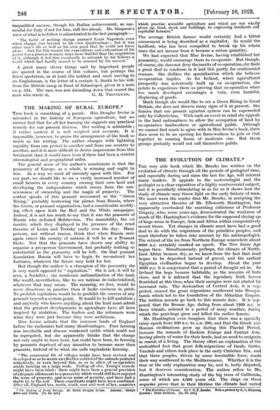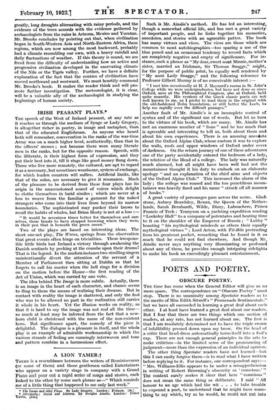THE EVOLUTION OF CLIMATE.* THE very able book which Mr.
Brooks has written on the evolution of climate through all the periods of geological time, and especially during and since the last Ice Age, will interest many readers. It appeals to the meteorologist and the geologist as a clear exposition of a highly controversial subject, but it is peculiarly stimulating in so far as it shows how the study of climate may throw light on the early history of man. We must warn the reader that Mr. Brooks, in accepting the very attractive theories of Mr. Ellsworth Huntington,' has apparently overlooked the searching criticisms of Professor Gregory, who, some years ago, demonstrated the weakness of much of Mr. Huntington's evidence for the supposed drying up of large areas in Europe, Asia and Africa within comparatively recent times. Yet changes in climate must have had a good deal to do with the migrations of the primitive peoples, and must therefore be taken into account by the anthropologist. The retreat of the ice from Northern Europe somewhere about 8000 B.C. certainly marked an epoch. The New Stone Age began then. Simultaneously, perhaps, the climate of North- East Africa became dry, as we know from the fact that mud began to be deposited instead of gravel, and the earliest Egyptian civilization began to develop. About the year 3000 B.C. it is conjectured that a period of drought set in. In Ireland the bogs became habitable, as the remains of huts show, and it is inferred that the legendary Irish heroes flourished at this time, when their energies were not abated by incessant rain. The desiccation of Central Asia, it is sug- gested, caused the great migrations southward into Mesopo- tamia which led to the foundation of the Akkadian Empire. The written records go back to this remote date. It is sup- posed that the Bronze Age, dating from about 1800 B.c. in these islands, ushered in a period of rainy weather, during which the peat-bogs grew and killed the earlier forests.
Mr. Huntington even imagines that there was a specially rainy epoch from 500 B.C. to A.D. 200, and that the Greek and Roman civilizations grew up during this Pluvial Period, because the nomads of Eastern Europe and Central Asia, having plenty of water for their herds, had no need to emigrate in search of a living. The theory offers an explanation of the undoubted fact that great folk-migrations of Gauls, Goths, Vandals and others took place in the early Christian Era, and that these peoples, driven by some irresistible force, made their way southward to the Mediterranean. Whether it is the true or the only explanation may be, and is, hotly disputed, but it deserves consideration. The author refers to Mr, Huntington's interesting study of the big trees of California, some of which are 4,000 years old. The rings on these sequoias prove that in their lifetime the climate had varied • The Mal lug of Rural Europe. BY Helen Douglas int*. London : George • The Evotutton of Climate. By C. E. P. Books. With a preface by 0, C, Bbuls42411
greatly, long droughts alternating with rainy periods, and the evidence of the trees accords with the evidence gathered by archaeologists from the ruins in Arizona, Mexico and Yucatan. Mr. Brooks concludes by pointing out that, when civilization began in South-Western Asia and North-Eastern Africa, these regions, which are now among the most backward, probably had a climate resembling our own, with a heavy rainfall and daily fluctuations of weather. If this theory is sound, we are freed from the difficulty of understanding how an active and progressive civilization developed in the enervating climate of the Nile or the Tigris valley. Further, we have a definite explanation of the fact that the centres of civilization have moved northward and westward. We must heartily commend Mr. Brooks's book. It makes the reader think and will pro- mote further investigation. The meteorologist, it is clear, will be a valuable ally of the archaeologist in studying the beginnings of human society.



































































 Previous page
Previous page